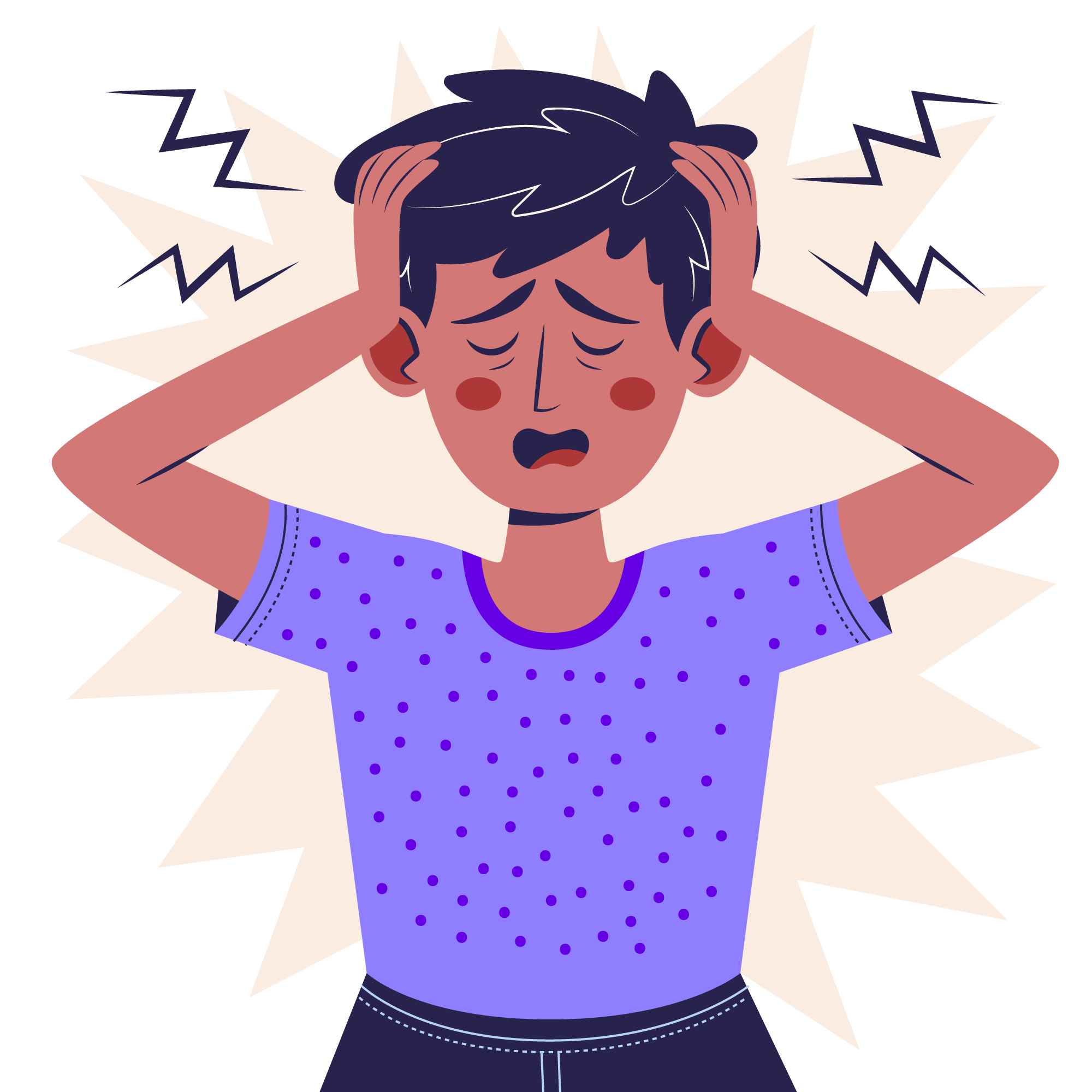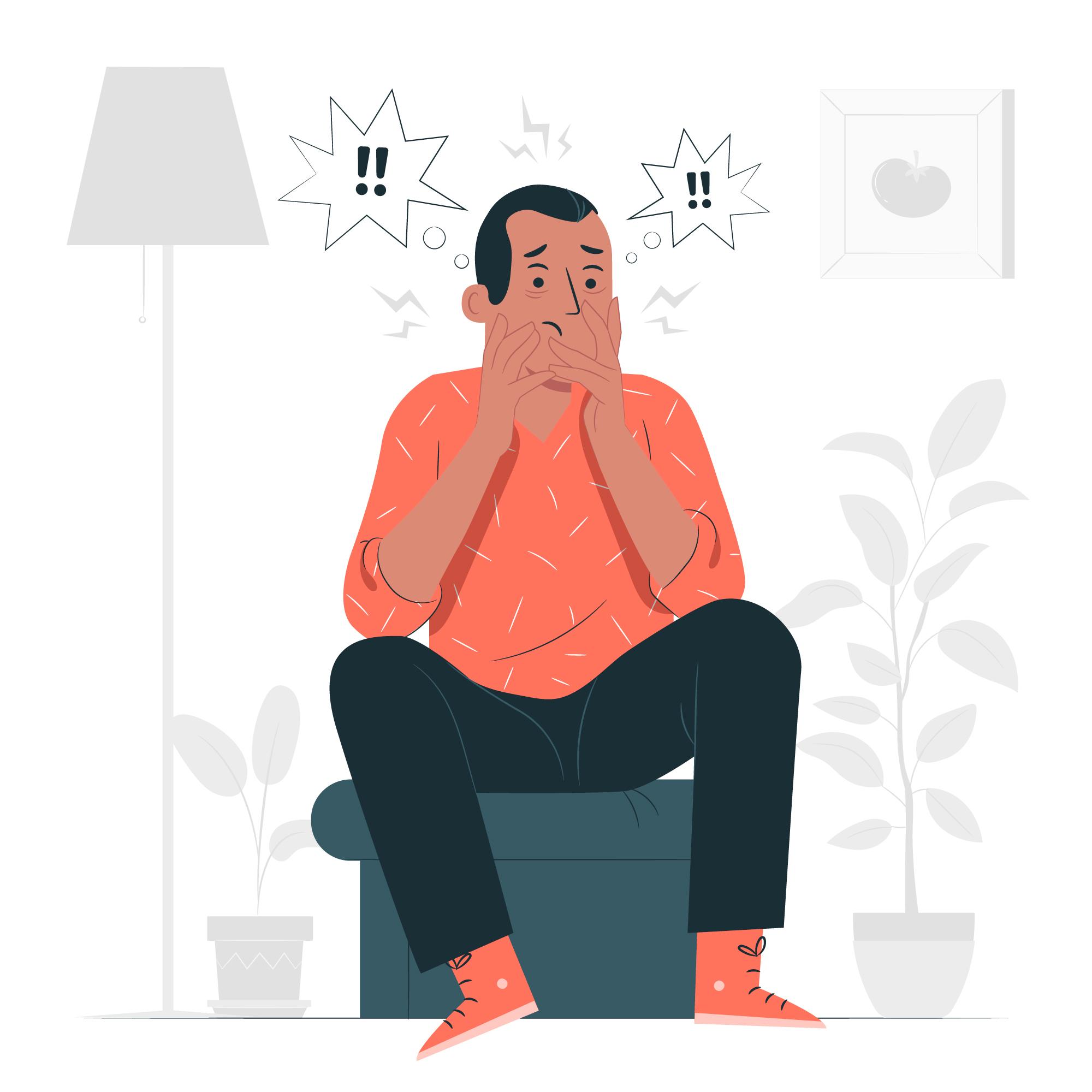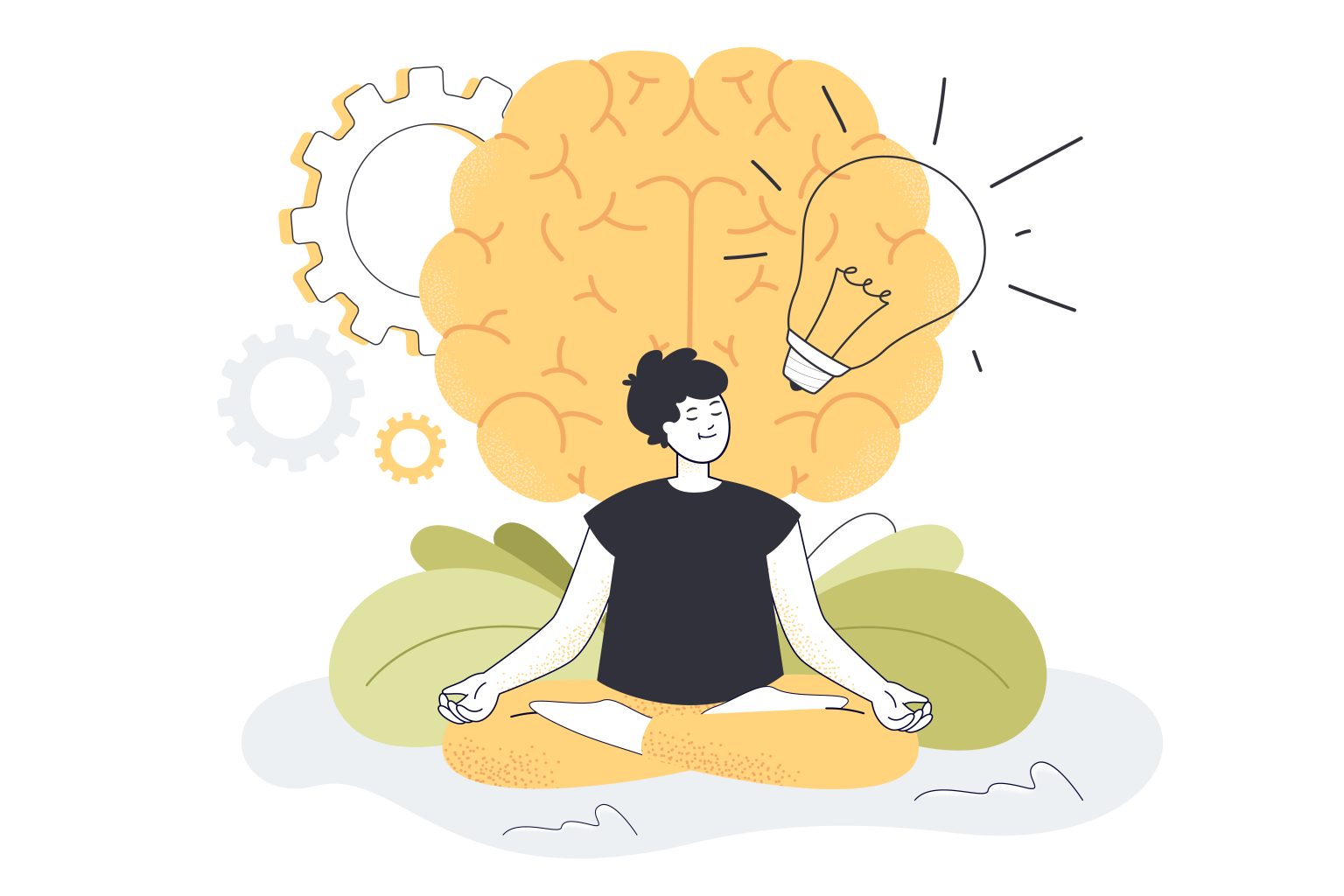
A panic attack can be a scary and confusing experience to go through.
During a panic attack, you can feel like your heart is beating faster and you are losing control.
Panic attacks usually happen without any immediate or apparent reason. It can occur even if you are relaxed. Some of the main signs of a panic attack are:
- Feeling breathless
- Feeling like you are losing control over your mind and body
- Having cold sweats
- Feeling numb in various parts of your body
- Heaviness in the chest
- Rapid heartbeat or palpitations
- Having blurred or tunnel vision.
Explaining the feelings and sensations that come with a panic attack to another person can be very difficult. Moreover, it can also be difficult for you to make sense of the experience of a panic attack. The immense anxiety, the suffocation, breathlessness, and disconnection with things around you can feel tough to put into words.
Panic attacks can also make you feel like they can happen again. This can even cause to avoid certain places due to the fear of it all coming up again(agoraphobia.)
This article highlights some of the strategies and things you can do when you are going through a panic attack. We also take you through certain lifestyle changes you can make to prevent panic attacks in the future.
Thus, this article can be used as a “Guide on Panic Attacks.”
What Causes Panic Attacks?
While panic attacks may feel threatening and fatal, they could be a way for our body to cope with underlying anxiety.
Our mind constantly watches out for, and protects our body against threats. These threats could be external like an animal running behind us, writing an exam, going through a break-up, or experiencing abuse.
It could also be internal, like our own anxious thoughts, or feelings of anxiety. When our mind detects a threat, our body can go into overwhelm and this can manifest as a panic attack.
Over time, people having panic attacks often develop a fear of panic attacks. They are afraid that an attack may come on anytime.

The Invisible Underlying Cause of a Panic Attack
Most often Panic Attack is the result of a chronic and suppressed anxiety. There is a non-acknowledgement or denial of the anxiety or a lack of addressing it, which then gets converted into a panic attack.
Once a panic attack has occurred the fear of panic attacks itself, feeds the anxiety further, which can lead to further panic attacks. Often, the fear of panic attacks itself is used to displace and disguise the actual anxiety. The real reason for anxiety continues to be unaddressed or denied and instead the person continues to fear getting more panic attacks.
The symptoms of a panic attack move our attention away from our distressing thoughts and feelings. Our body produces these strong symptoms of chest heaviness, shallow breathing, and palpitations, to take our attention away from our anxiety.
After experiencing repeated panic attacks, we may develop a fear of having them again, and it may lead to fear of going to public spaces. The fear of panic attacks and avoidance then becomes the focus of our lives. And the real reason for our anxiety does not get processed.
This invisible and often very real reason for panic attacks is not addressed even by mental health professionals. Thus, we need a sustainable resolution that can help us with the symptoms of panic attacks, while also addressing the root causes of it- which are leading to anxiety and stress.
What To Do When You Are Experiencing A Panic Attack
Panic attacks happen suddenly. It can be an overwhelming experience. But, there are some ways to reduce the extreme sensations we feel during a panic attack. Here are some steps you can follow to reduce the intensity of a panic attack:
Be aware of your experience: The first step towards reducing the intensity of a panic attack, is to know that you are going through one. This will help you feel less anxious, as you are now aware of your experience.
Focus on your breathing: One of the first signs you notice in panic attacks is difficulty in breathing. To work through this, inhale deeply through the nose. Then, exhale through the mouth. Focusing on your breathing can make you feel more grounded. As a result, you feel more in control of the situation.
Find a comfortable place: Panic attacks can be an uncomfortable experience. Moving to a location that is airy, quiet, and spacious can put you at ease.
Use Ice: Using ice is a less-known way to handle panic attacks. You can rub ice cubes on your palms, wrists, face, or neck. You may also use cold water if ice isn’t available. Ice acts like a mild “brake” to make you focus less on what is going wrong. It helps you pay attention to your surroundings.
Use your sense organs: Sense organs pick up signals from our surroundings. You can guide your sense organs to pick up signs of safety from your surroundings. These signs from the sense organs can help you feel safe in your body during panic attacks. The 5-4-3-2-1 method helps use our sense organs during a panic attack. The process works as follows:
Focus on your breathing. You can do this yourself or have someone guide you through it.
- Look around and notice five things you can see. Notice the colors, patterns, and shapes of the objects you see.
- Next, pay attention to four things you can touch. And focus on them, and bring your mind to how the objects feel in your hands.
- Now, notice three things you can hear. Notice the sounds around you and bring your attention to them.
- The next step is to bring your focus to two things you can smell. Find something like coffee, lime, perfume, or essential oils that have a distinct scent to draw your attention to.
- Finally, find one thing you can taste. Notice what flavours and textures stand out when you taste.
The 5-4-3-2-1 grounding technique is easy to use, and can be helpful while you are experiencing a panic attack.
Why Are These Techniques Helpful?
Panic attacks can be overwhelming to the body and mind. It may make you feel like there is no way out of it. Knowing that you are having an extreme, but temporary, stress response will help you feel better. Being aware that you will be okay can put you more at ease.
Some of the techniques we have provided above are called “grounding techniques.”
Panic attacks seem to happen out of nowhere, without any warning. They can make you feel alarmed and tense in your body and mind. Thus, doing grounding techniques can help you feel more in touch with your surroundings.

Are your anxieties holding you back?
Counseling can be a great tool for you to manage and overcome your panic attacks and lead a happy, stress-free life.
We are here for you.
Counseling And Therapy For Panic Attacks

Seeking the help of a Counselor can be a great way to handle panic attacks. Panic attacks can often feel embarrassing, as you may be experiencing them in a public space. It can make you feel afraid of the symptoms themselves. It can also make you worry about the chances of another attack coming back.
Therapists or Counselors are trained Professionals who can help you manage the symptoms of panic attacks. They can also help you look at the emotions underlying panic attacks such as fear, embarrassment, or worry. Panic attacks are often a sign of an overwhelmed nervous system. Therapy will help you heal the nervous system by working with the mind and the body.
Panic attacks can be an uncomfortable experience for the mind and body. Beneath panic attacks are unaddressed anxiety and stress that you may be unaware of.
To work with the body, therapists work towards helping you sit with uncomfortable emotions and process them. By bringing these emotions to the forefront and understanding them, you will gradually begin to heal your nervous system. Therapists also work with the mind for panic attacks. Panic attacks are rooted in fear and anxiety. Counselors help you identify negative beliefs and patterns of thought and help you challenge and overcome them.
Therefore, the therapist helps you create more space within you to handle an overwhelming experience like a panic attack. Therapy also helps you become more aware of your stress that you experience, and teaches you healthy ways to cope with them.
Self-Help Techniques For Panic Attacks
Panic attacks can be a sign of a nervous system that has been under constant stress. Therefore, healing the nervous system can prevent such attacks in the future.
Some of the ways you can heal your nervous system and prevent chances of having more panic attacks are:
- Spending more time outdoors around nature.
- Engaging in mild forms of exercise like jogging, walking, or yoga
- Practicing mindfulness techniques and meditation
- Reducing consumption of substances like alcohol, nicotine, or coffee.
- Seeking professional help through counseling.
Panic Attacks Vs. Panic Disorder
We may have heard both the terms panic attacks and panic disorder being used interchangeably.
However, panic attacks are a singular event. Panic attacks are common, and it affects 11% of adults every year. It usually happens during stressful periods in one’s life.
Panic disorder involves repeated panic attacks. Having repeated panic attacks can impact one’s life negatively.
Panic Attacks and Agoraphobia

With repeated panic attacks, some people may develop an aversion or fear of crowded or public spaces. Agoraphobia is a fear people develop that can arise due to a panic disorder.
In such situations, people avoid public places, public transportation, and other places where they feel they may not receive help or support if a panic attack occurs.
Agoraphobia can affect one’s ability to manage life as the fear of having another panic attack consumes their mind completely.
Panic attacks can feel dangerous, but they usually don’t put you at any real risk. You can easily manage and even avoid a panic attack with the appropriate strategies and lifestyle adjustments.
If you are suffering from panic attacks, we are here to help you. Our therapists at Inner Space are trained to help you manage panic attacks by working from its roots and reducing the negative impacts of the condition.
Understanding the sensations and signs of panic attacks can give you a sense of safety inside your body. Learning these methods can help you in solving the “panic puzzle” and get back your sense of peace and wellbeing.
Frequently Asked Questions
Agoraphobia can manifest differently in different people. Some people may notice their symptoms have gone completely, while some may continue to experience the symptoms in varying intensity. However, with early intervention and having healthy coping skills can help ease out the intensity of agoraphobia symptoms.
Panic Attacks cannot be prevented. But, it can be managed with early intervention, counseling, lifestyle changes, and having healthy coping skills in place. With these shifts, you can notice a decrease in your chances of having a panic attack in the future.
While medications do help in managing certain symptoms of panic attacks, many people do not require them. They can manage their symptoms without medication by going for therapy, using self-help and stress management strategies, and having a healthy lifestyle.
About the Author
This article was written by Parvathi Ganesan, Counselor at Inner Space. This post was consulted & approved by professional therapists practicing online therapy and counseling.
Ask a Therapist
If you are interested to know more about panic attacks and other mental health topics, ‘Ask A Therapist’ is a platform for you to ask your questions related to Mental Health, Mindfulness & Emotional Well-Being to our team of qualified Therapists.





